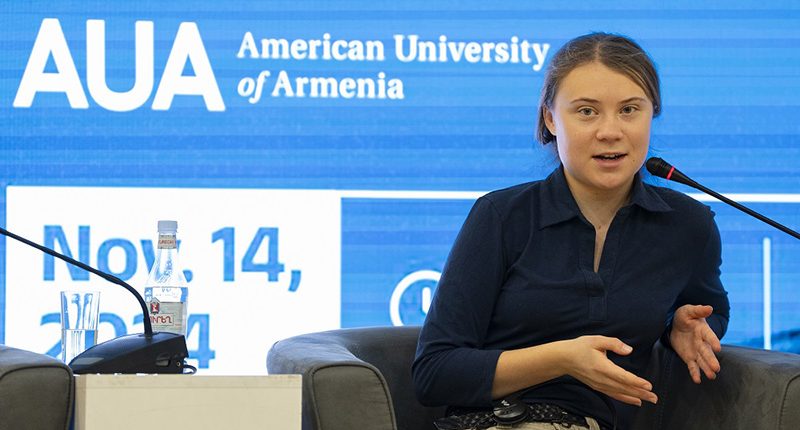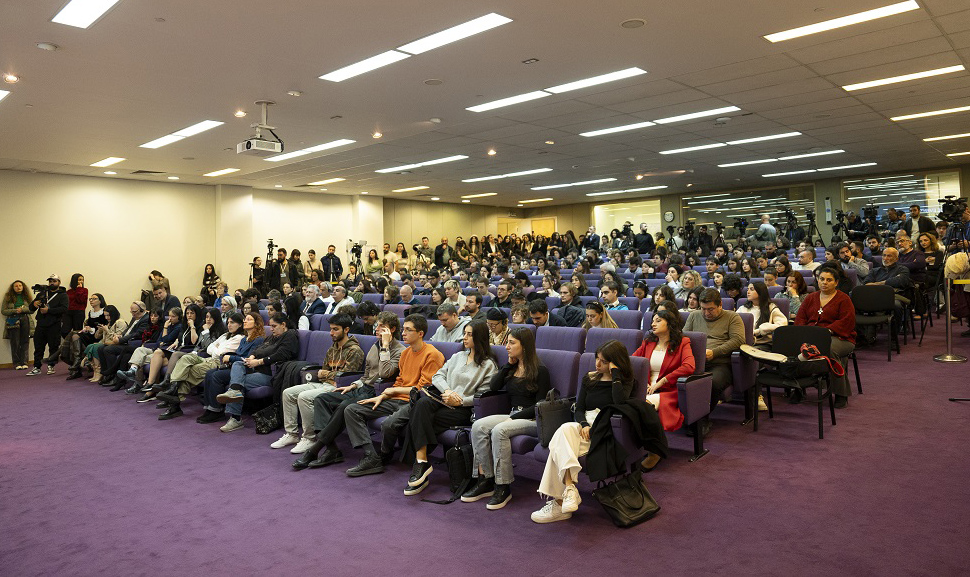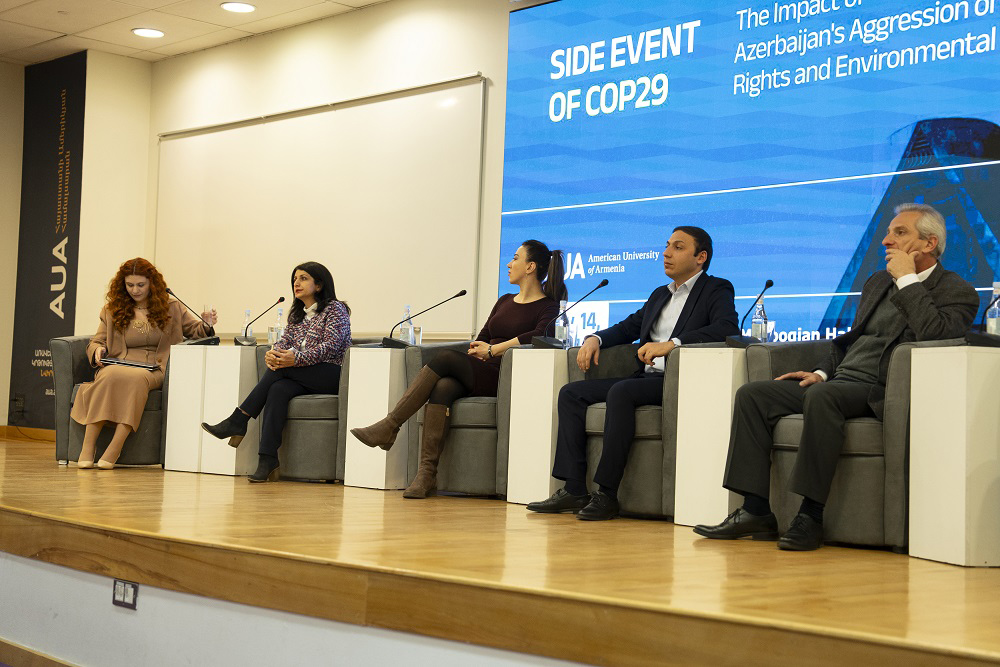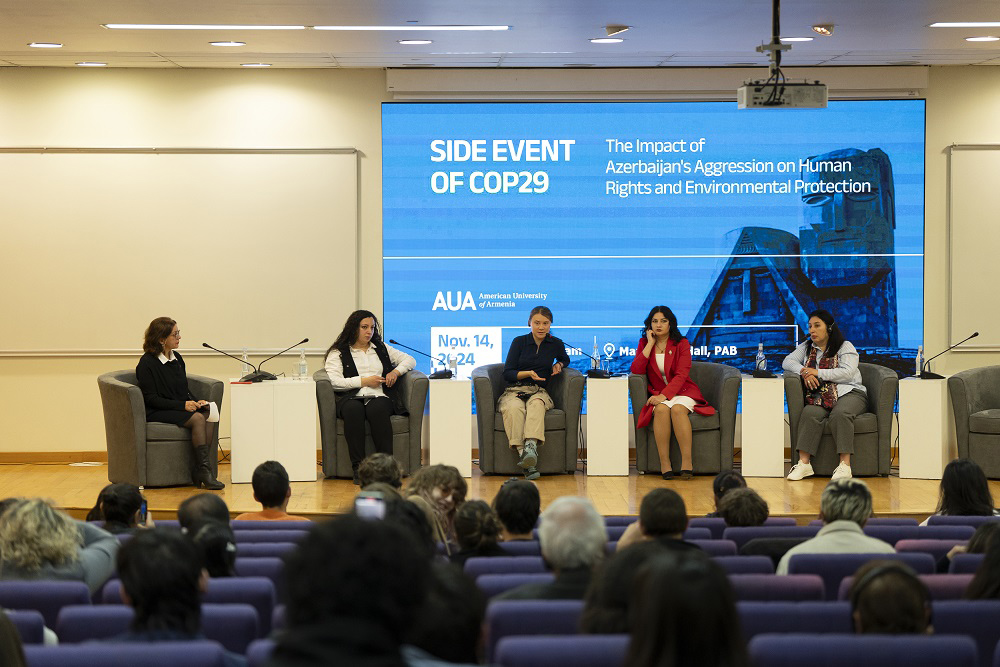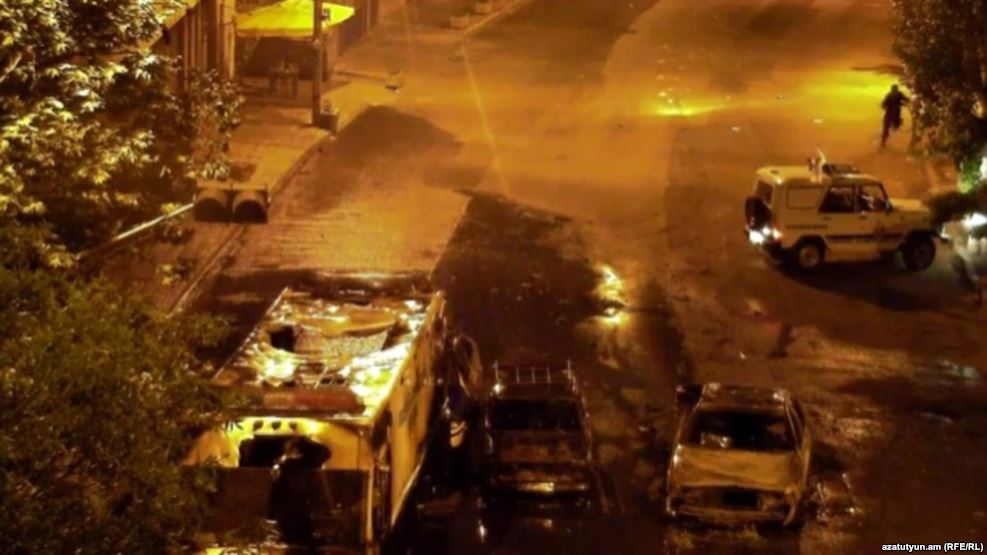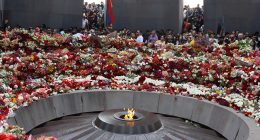YEREVAN — On November 14, the American University of Armenia (AUA) hosted internationally renowned climate justice activist Greta Thunberg. During her visit, Thunberg met with AUA President Dr. Bruce Boghosian and participated in a panel session.
Thunberg has been widely credited with raising global awareness about the climate crisis, a movement often referred to as “The Greta Effect.” She has been included in Time Magazine’s 100 Most Influential People, named the youngest Time Person of the Year, featured in Forbes’ list of the World’s 100 Most Powerful Women, and nominated for the Nobel Peace Prize.
At the conference titled “The Impact of Azerbaijan’s Aggression on Human Rights and Environmental Protection,” held at AUA in parallel with the 2024 United Nations Climate Change Conference (COP29), Thunberg served as a featured panelist. The event responded to the UN’s decision to designate Azerbaijan as the host of COP29, despite serious concerns over its history of aggression toward Nagorno-Karabakh (Artsakh) and the authoritarian policies of President Ilham Aliyev.
In her keynote speech, Thunberg accused the world of hypocrisy for ignoring the crimes committed by Azerbaijan against Armenians.
“Why am I not at COP-29? Our agenda, which adheres to the principles of climate justice, contradicts the agenda of COP-29 and what is happening in Azerbaijan,” she stated during the forum on “The Impact of Azerbaijan’s Aggression on Human Rights and Environmental Protection.”
According to Thunberg, Azerbaijan is a repressive country with plans to expand mineral extraction and a history of ethnic cleansing in Artsakh (Nagorno-Karabakh).
“It’s revolting that COP-29 is being held in this country amidst these atrocities. This is hypocrisy and duplicity. Azerbaijan not only commits these crimes without accountability but is also given a platform to legitimize them, including ethnic cleansing. The world remains silent and enables this,” Thunberg noted.
She emphasized that climate conferences should not be hosted in countries that repress their citizens’ rights.
“Azerbaijani activists live as if imprisoned, stripped of their rights. The ethnic cleansing Azerbaijan is responsible for, along with the suffering endured by Armenians due to its military aggression—including torture, forced displacement, prisoners, and hostages—are categorically unacceptable. The world’s silence on this, allowing Azerbaijan to greenwash these crimes, is inexcusable. It’s also unacceptable that countries continue to purchase minerals from Azerbaijan without addressing these issues,” Thunberg said.
The conference examined the human rights and environmental effects of Azerbaijan’s actions in the region, covering war crimes, blockades, ethnic cleansing, and damage to cultural and environmental heritage. The event brought together lawyers, environmentalists, journalists, and experts to discuss these urgent issues. Shushanik Harutyunyan of the Armenian Climate Justice Initiative delivered opening remarks, introducing the main topics. AUA President Dr. Bruce Boghosian welcomed the audience and expressed gratitude to Thunberg and other distinguished speakers for their participation.
“The American University of Armenia is proud to host discussions on such urgent topics. Founded on principles of academic freedom, intellectual discovery, and community impact, we have always stood at the forefront of these critical conversations, and I hope we always will. Today, you’ll hear from our faculty, who are committed to human rights and environmental advocacy. I am proud to see them on this stage,” remarked Dr. Boghosian.
The first panel, moderated by lawyer and human rights defender Luiza Vardanyan, focused on human rights violations and war crimes during the 2020 Artsakh War. Speakers included Ara Ghazaryan (LL.M. ’01), an international law specialist; Anna Melikyan, a legal expert with the NGO Protection of Rights Without Borders; Siranush Sahakyan, AUA lecturer and president of the Center for International and Comparative Law; and Gegham Stepanyan (MPSIA ’16), human rights defender of the Republic of Artsakh. Each speaker provided unique insights into the legal, humanitarian, and geopolitical dimensions of the 2020 War, the subsequent blockade, and the full occupation of Artsakh in 2023. The discussions underscored the need for vigilance, international cooperation, and adherence to human rights laws, urging the international community to address these issues.
The second panel, moderated by Sona Ayvazyan, director of Transparency International, explored the consequences of Azerbaijan’s aggression on the environment and cultural heritage. Speakers included Victoria Burnazyan, vice president of Ecolur NGO; Dr. Irina Ghaplanyan, climate change expert and AUA adjunct lecturer; Armine Hayrapetyan, director of the State Service for the Preservation of the Historical Environment of Artsakh; and Tehmine Yenokyan, director of Green Armenia NGO. The panelists provided an in-depth analysis of the Artsakh conflict’s environmental and cultural impacts, addressing Azerbaijan’s targeted destruction of ancient monasteries, churches, and other cultural landmarks.

